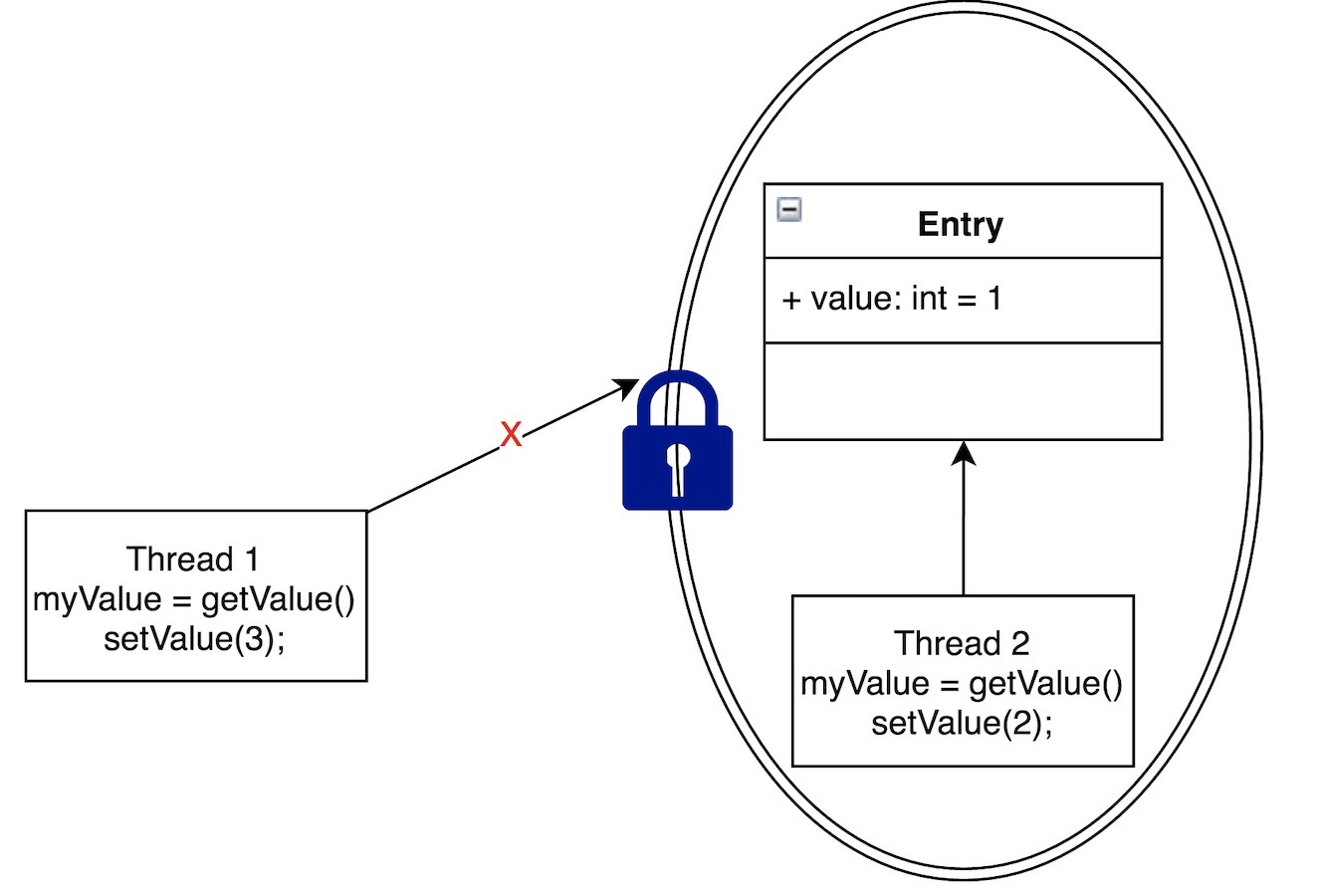02.线程安全
参阅《Concurrent-Notes》相关章节了解线程安全知识。
线程安全
在 Java 中,保证线程安全一般会用两种方式:锁和原子变量。volatile 确保每次操作都能强制同步 CPU 缓存和主存直接的变量。而且在编译期间能阻止指令重排。读写并发情况下 volatile 也不能确保线程安全。
锁

采取加锁的方式,默认线程会冲突,访问数据时,先加上锁再访问,访问之后再解锁。通过锁界定一个临界区,同时只有一个线程进入。如上图所示,Thread2 访问 Entry 的时候,加了锁,Thread1 就不能再执行访问 Entry 的代码,从而保证线程安全。下面是 ArrayBlockingQueue 通过加锁的方式实现的 offer 方法,保证线程安全。
public boolean offer(E e) {
checkNotNull(e);
final ReentrantLock lock = this.lock;
lock.lock();
try {
if (count == items.length)
return false;
else {
insert(e);
return true;
}
} finally {
lock.unlock();
}
}
原子变量
原子变量能够保证原子性的操作,意思是某个任务在执行过程中,要么全部成功,要么全部失败回滚,恢复到执行之前的初态,不存在初态和成功之间的中间状态。例如 CAS 操作,要么比较并交换成功,要么比较并交换失败。由 CPU 保证原子性。通过原子变量可以实现线程安全。执行某个任务的时候,先假定不会有冲突,若不发生冲突,则直接执行成功;当发生冲突的时候,则执行失败,回滚再重新操作,直到不发生冲突。

如图所示,Thread1 和 Thread2 都要把 Entry 加 1。若不加锁,也不使用 CAS,有可能 Thread1 取到了 myValue=1,Thread2 也取到了 myValue=1,然后相加,Entry 中的 value 值为 2。这与预期不相符,我们预期的是 Entry 的值经过两次相加后等于 3。CAS 会先把 Entry 现在的 value 跟线程当初读出的值相比较,若相同,则赋值;若不相同,则赋值执行失败。一般会通过 while/for 循环来重新执行,直到赋值成功。
代码示例是 AtomicInteger 的 getAndAdd 方法。CAS 是 CPU 的一个指令,由 CPU 保证原子性。
/**
* Atomically adds the given value to the current value.
*
* @param delta the value to add
* @return the previous value
*/
public final int getAndAdd(int delta) {
for (;;) {
int current = get();
int next = current + delta;
if (compareAndSet(current, next))
return current;
}
}
/**
* Atomically sets the value to the given updated value
* if the current value {@code ==} the expected value.
*
* @param expect the expected value
* @param update the new value
* @return true if successful. False return indicates that
* the actual value was not equal to the expected value.
*/
public final boolean compareAndSet(int expect, int update) {
return unsafe.compareAndSwapInt(this, valueOffset, expect, update);
}
在高度竞争的情况下,锁的性能将超过原子变量的性能,但是更真实的竞争情况下,原子变量的性能将超过锁的性能。同时原子变量不会有死锁等活跃性问题。
